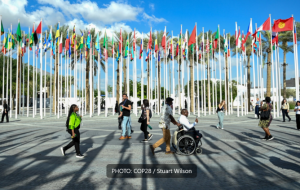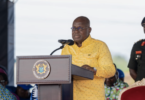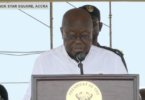
Source: Myjoyonline.com
The ongoing COP28 in Dubai reveals a notable absence of official representatives from Afghanistan, Myanmar, and San Marino.
The Democratic People’s Republic of Korea has two representatives, Nicaragua has six, Eritrea sent seven, the Republic of Moldova has eight, Liechtenstein has eight, Andorra has eleven, and Saint Vincent and the Grenadines sent fifteen. These figures represent the lowest number of delegates from the respective countries at this year’s COP.
For the third consecutive year, Afghanistan and Myanmar have not registered a delegation at the COP, while San Marino is also absent from the provisional lists this year.
The Taliban authorities in Afghanistan have criticized the decision not to invite its representatives to the UN climate conference. A statement from the National Environmental Protection Agency (NEPA) highlighted that despite “comprehensive efforts” to address climate change issues in the country, Afghan delegates had not received invitations.
The National Environmental Protection Agency (NEPA) in Afghanistan, backed by a senior government spokesperson, has decried the exclusion of Afghan representatives from COP28, saying it is “purportedly due to political factors.” Notably, no country has officially recognized the Taliban authorities since they regained control over two years ago.
The NEPA statement emphasized that, despite Afghanistan contributing a mere 0.08 percent to global greenhouse gas emissions, the country is highly vulnerable to the adverse effects of climate change. According to a recent UN mission in Afghanistan (UNAMA) statement, the nation ranks eighth on the Notre Dame Global Adaptation Index, signifying its vulnerability and insufficient preparedness for climate change.
UNAMA highlighted that Afghanistan is witnessing an increase in extreme weather conditions, including floods, droughts, and sand and dust storms. These events lead to loss of lives and livelihoods, causing substantial damage to infrastructure.
Following the Taliban’s takeover in Afghanistan, funding to the country, including support for climate change initiatives, has experienced significant setbacks. The COP28 witnessed the formal launch of a “loss and damage” fund, a long-sought initiative by vulnerable nations facing severe natural disasters linked to global warming.
The National Environmental Protection Agency (NEPA) in Afghanistan expressed concern that the exclusion of Afghanistan from these talks creates obstacles for the country to access crucial financial mechanisms. The agency called for steadfast support from international partners to address the global phenomenon of climate change in Afghanistan.
Notably, Myanmar ranked 2nd in the Global Climate Risk Index’s top 20 countries most affected by extreme weather events from 2000 to 2019 among 180 nations.
The Country, Myanmar, has a history of enduring catastrophic events, notably the 2008 Cyclone Nargis that claimed over 140,000 lives. Despite the heightened vulnerability to climate change impacts, uncertainty looms over the country’s ability to access the climate fund.
Myanmar, absent from this year’s COP delegation, faces an urgent need for financial resources due to its limited capacity to manage the impacts of climate change. Unfortunately, the country’s prospects for obtaining assistance are hindered by international sanctions imposed in the aftermath of the violent 2021 coup.
The Republic of San Marino, an early signatory to the Framework Convention on Climate Change, has demonstrated a strong commitment to reducing greenhouse gas emissions. Through adherence to Convention commitments and the enactment of laws promoting energy conservation and renewable resources, the country has made significant strides.
The completion of the first National Communication in September 2009 marked a crucial milestone, followed by the ratification of the Kyoto Protocol in April 2010. This step, initiated in 1992 with the Convention signing, reflects the country’s dedication to addressing climate change.
A dedicated technical working group, established to exclusively address climate-related issues, has overseen these efforts, including the compilation of the second National Communication. However, despite these commitments, the absence of a representative at COP28 raises questions, particularly after sending only three representatives to the previous COP in Egypt.
The United Arab Emirates leads in delegate representation at COP28 with 4409, inclusive of 3789 overflow delegates, followed by Brazil with 3081, including 1744 overflow delegates. China has 1411 delegates, with 1192 as overflow delegates, and Nigeria is the fourth-highest country with 1411 delegates, of which 821 are overflow delegates. Ghana holds the nineteenth position, contributing 618 delegates, including 523 overflow delegates.
In total, 97372 provisional delegates are participating in this year’s event. Representatives from United Nations Secretariat units and bodies, totaling 880, hail from 44 states/organizations. Additionally, there are 608 overflow representatives from 28 states/organizations. Specialized agencies and related organizations bring 846 representatives from 24 states/organizations, with an overflow of 523 representatives from 17 states/organizations.
Intergovernmental organizations contribute 1897 representatives from 120 states/organizations, while NGOs send 14338 representatives from 2158 states/organizations. Other categories include Global Climate Action, Host Country Guest, and Temporary Passes with 561, 4885, and 822 registered participants, respectively.
The total number of observer organizations stands at 2350 states/organizations with 25360 registered participants. Media presence is marked by 1293 states/organizations, boasting 3972 registered participants, while other categories encompassing technical, support staff, security, and secretariat amount to 16345 registered participants. This culminates in a total on-site participation of 97372.
For virtual-only participation, NGOs from 625 states/organizations contribute 2574 representatives, Intergovernmental organizations have 122 participants from 32 states/organizations, specialized agencies and related organizations send 33 representatives from 8 states/organizations, and United Nations Secretariat units and bodies include 92 representatives from 12 states/organizations. The overall virtual-only participation tallies up to 3074.
In comparison, the inaugural climate COP in Berlin in 1995 saw 3,969 delegates, while last year’s COP in Sharm El-Sheikh drew almost 50,000 delegates. This marked an increase from the 38,000 attendees at COP26 in Glasgow in 2021, showcasing a trend of rising participation at climate COPs following a dip post-COP21 in Paris in 2015.
It’s essential to note that these figures are provisional and based on registered delegates for the summit. The UNFCCC will release final figures, considering participants who collect physical badges at the venue, after the summit concludes.
Types of delegates at COP
At COP28, there are two distinct categories of delegates: Party delegates and Overflow delegates.
In the context of the UNFCCC and its annual COP, Party delegates are individuals representing countries (parties) that have signed the UNFCCC. These delegates play a vital role in negotiating and making decisions concerning international climate policies and agreements. Each Party delegate represents their country’s interests, communicates its positions, and actively participates in various discussions and working groups during COP meetings.
On the other hand, Overflow delegates typically include individuals who are part of a country’s delegation but may lack official accreditation to access the main negotiation rooms or plenary sessions due to space limitations. COP meetings attract a diverse array of participants, such as government officials, non-governmental organizations (NGOs), observers, and media. Consequently, overflow areas or side events may be designated for individuals without full access to follow the proceedings.
This distinction between Party delegates and Overflow delegates underscores the logistical and practical challenges of managing a large international conference with diverse participants and limited space in certain venues.
Source: www.myjoyonline.com









